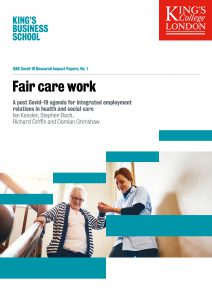 The NIHR-funded SHARE programme aims to build social practitioners’ skills and knowledge, to use research to inform and improve services in the workplace. The SHARE programme is a collaboration between Kingston University and King’s College London working closely with NIHR ARC South London and the NIHR Policy Research Unit in Health and Social Care Workforce. Filipa Maia, one of the people who have been awarded funding to take part in the programme, writes here about her experience of the SHARE programme and how her research could improve care for older people in care homes. Filipa is an education, research and engagement officer at Nightingale Hammerson, a care home provider. (1,249 words)
The NIHR-funded SHARE programme aims to build social practitioners’ skills and knowledge, to use research to inform and improve services in the workplace. The SHARE programme is a collaboration between Kingston University and King’s College London working closely with NIHR ARC South London and the NIHR Policy Research Unit in Health and Social Care Workforce. Filipa Maia, one of the people who have been awarded funding to take part in the programme, writes here about her experience of the SHARE programme and how her research could improve care for older people in care homes. Filipa is an education, research and engagement officer at Nightingale Hammerson, a care home provider. (1,249 words)
Please tell us a bit about your background and why you applied for the funding?
I moved to London in July 2021, shortly after completing a Master’s degree in Sociology at Nova University of Lisbon. I majored in English and Spanish studies, before my Master’s in Women’s Studies. By mixing my passions for literature and theatre, I wrote my thesis, “Women’s views of their own bodies: a study on representations of the female body in feminist theatre.” During that process, I discovered how much I like writing about people, their stories, their work and their motivations. Sociology felt like a good choice, a way to understand people more deeply in society and create space for their experiences to be explored and shared.
When I arrived in London, I stepped into the world of care by chance and found an entirely new way to connect with people. My first role was as a therapy assistant at Nightingale Hammerson, where I spent hours alongside residents and observed healthcare professionals of all kinds (physiotherapists, occupational therapists, healthcare assistants, registered nurses) all working with one shared goal of giving residents the best possible quality of life. Continue reading
 Dr Kalpa Kharicha
Dr Kalpa Kharicha Dr Carl Purcell
Dr Carl Purcell

